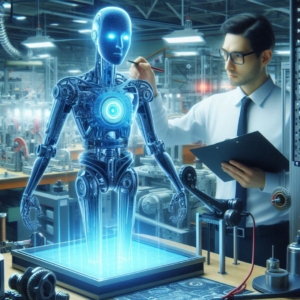Overview of Customized Manufacturing with GCP AI Services, Cloud Computing, and Artificial Intelligence

The manufacturing landscape in the UAE is undergoing a significant transformation. It is shifting from traditional mass production to a more flexible and responsive model known as customized manufacturing (CM). This evolution, powered by technologies like GCP AI services, is largely fueled by the rising demand for personalized products. Additionally, manufacturers must adapt quickly to changing consumer preferences. Traditional large-batch production methods lack the flexibility needed to meet the diverse needs of individual customers. As a result, a new generation of smart factories is emerging, characterized by multi-variety and small-batch production capabilities.
Cloud computing and artificial intelligence are critical in this transformation. They enable manufacturers to merge advanced information and communication technologies with traditional manufacturing processes. This integration allows for self-assessment, operational optimization, dynamic reconfiguration, and intelligent decision-making within manufacturing systems. The key features of a customized smart factory include:
- Self-Perception: Manufacturing systems that can monitor and evaluate their operational status in real-time.
- Operational Optimization: Continuous improvement of production processes through data analysis and machine learning.
- Dynamic Reconfiguration: The ability to modify production lines and processes based on changing demands and conditions.
- Intelligent Decision-Making: The use of AI algorithms to make informed choices about resource allocation, production scheduling, and quality control.
The customer-to-manufacturer model emphasizes direct interaction between consumers and manufacturing systems. This allows for rapid customization of products. Consequently, this model boosts customer satisfaction and enhances resource utilization and operational efficiency.
AI Technologies and GCP AI Services in Customized Manufacturing
Cloud computing and artificial intelligence are essential for implementing customized manufacturing. They improve various aspects of the manufacturing process, including design, production, management, and service. Key AI-driven technologies relevant to this transformation include:
- Machine Learning (ML): ML algorithms analyze historical data to forecast future trends. They optimize production schedules and enhance quality control. They empower systems to learn from past experiences and make data-driven decisions.
- Deep Learning (DL): A subset of ML, DL excels in tasks such as image recognition and natural language processing. In manufacturing, DL can be utilized for defect detection and predictive maintenance by analyzing visual data from production lines.
- Multi-Agent Systems (MAS): These systems involve multiple autonomous agents that collaborate to achieve common goals. In customized manufacturing, agents can negotiate resource allocation and manage production tasks.
- Internet of Things (IoT): IoT devices collect and transmit data from manufacturing equipment. This enables real-time monitoring and control, enhancing the integration of AI algorithms for better decision-making.
- Cloud and Edge Computing: Cloud computing provides the computational power necessary for processing large datasets. Edge computing allows for real-time data processing closer to the source, boosting responsiveness and reducing latency in manufacturing operations.
Implementation of GCP AI Services in AI-Driven Customized Manufacturing
The implementation of AI in customized manufacturing involves several key components and processes:
- Flexible Manufacturing Systems (FMS): FMS are designed to handle a variety of products with minimal downtime. AI algorithms facilitate the scheduling and coordination of production tasks.
- Dynamic Resource Scheduling: AI-driven dynamic scheduling mechanisms allow manufacturers to adapt to changing production demands. This involves real-time analysis of resource availability and production requirements.
- Intelligent Fault Diagnosis: AI algorithms can analyze data from manufacturing equipment to identify potential faults before failures occur. This predictive maintenance approach minimizes downtime.
- Personalized Product Design: AI tools enable manufacturers to offer customization options, allowing consumers to participate in the design process. This enhances customer satisfaction and fosters brand loyalty.
- Supply Chain Optimization: AI technologies improve supply chain management by predicting demand fluctuations and optimizing inventory levels. This ensures that manufacturers can meet customer demands effectively.
Challenges in GCP AI Services for AI-Driven Customized Manufacturing
Despite the many advantages of GCP AI services in customized manufacturing, several challenges need to be addressed:
- Data Privacy and Security: The integration of AI and IoT in manufacturing raises concerns about data privacy and security. Manufacturers must implement strong cybersecurity measures.
- High Computational Requirements: AI algorithms often demand significant computational resources. This may not be available in all manufacturing facilities.
- Integration with Legacy Systems: Many manufacturing facilities still rely on legacy systems that may not be compatible with modern AI technologies. Upgrading these systems can be costly.
- Skill Gap: The successful implementation of AI in manufacturing requires a skilled workforce. Manufacturers must invest in training and development to bridge this skill gap.
Future Directions for AI-Driven Customized Manufacturing in the UAE
The future of GCP AI services in AI-driven customized manufacturing in the UAE is bright, with several trends expected to shape its evolution:
- Increased Automation: As AI technologies advance, automation levels in manufacturing are expected to rise. This will lead to more efficient production processes.
- Greater Customization: The demand for personalized products will drive manufacturers to adopt more flexible production methods. AI will enable real-time customization.
- Sustainability Initiatives: AI technologies can help manufacturers optimize resource usage and reduce waste. This contributes to more sustainable production practices.
- Collaborative Robots (Cobots): The use of cobots, which work alongside human operators, will become more prevalent. These robots assist with tasks that require precision.
- Enhanced Data Analytics: The integration of advanced data analytics tools will allow manufacturers to gain deeper insights into their operations. This leads to continuous improvement and innovation.
Conclusion
GCP AI services are at the forefront of AI-driven customized manufacturing, marking a significant advancement in the manufacturing sector, particularly in the UAE. With integrated intelligence in smart manufacturing, companies can leverage cloud computing and artificial intelligence to optimize operations and improve product quality. However, addressing the associated challenges is crucial to unlocking the full potential of this transformative approach. As the industry continues to evolve, the integration of AI in manufacturing will play a pivotal role.
Do you like to read more educational content? Read our blogs at Cloudastra Technologies or contact us for business enquiry at Cloudastra Contact Us.